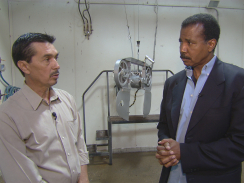Read more: http://horsetalk.co.nz/2013/05/26/queens-love-horses-explored-documentary/#ixzz2UPrtyPoF
Reuse: You may use up to 20 words and link back to this page. Other reuse not permitted
Follow us: @HorsetalkNZ on Twitter | Horsetalk on Facebook
Queen Elizabeth’s enduring love for horses is to be explored in a new documentary to air to Britain on Monday evening.


The Queen with a foal at Sandringham in 1964. © Camera Press
The one-hour documentary, The Queen: A Passion for Horses, will air on BBC1 at 9pm.
The Queen may be one of the most recognised individuals in the world, but away from the demands of royal duties, her private passion is for the world of horses.
She even spent part of her recent 87th birthday watching her racehorses train.
The documentary charts the Queen’s enduring relationship with horses and her 65-year career as one of Britain’s leading breeders.
The film, presented by Clare Balding, whose grandfather, father, and brother have all trained the Queen’s horses, gains behind-the-scenes access to the Queen as she pursues her dream to breed the ultimate racehorse.
There is an ancient connection between Royalty and horses. Monarchs have bred horses for hundreds of years, but none with the dedication of the current Queen.
She is one of the most respected breeders in Britain, with a successful track-record of producing world-class race horses. She has bred the winners of more than 1600 races.
Over the course of one spring season – from the births of foals at Sandringham, where every royal thoroughbred is born, to the thrill of race day at Newbury – the film reveals the Queen’s expertise and close personal involvement in producing top-class racehorses, as well as her work to preserve the native pony breeds of Britain.

The documentary is presented by Claire Balding.
Footage will show the Queen interacting with her newborn foals – she personally names them all – and inspects her horses in training.
Through new interviews with The Princess Royal, Zara Phillips and cousin and childhood friend Margaret Rhodes, coupled with archive footage and photographs, the documentary charts how the young Princess Elizabeth’s fascination with horses grew, and how her passion has been passed down to her daughter and granddaughter.
It includes interviews with stud managers, stud grooms, advisers and trainers, including ‘Horse Whisperer’ Monty Roberts, as well as jockey Hayley Turner, who reveal what it’s like working and racing for the Queen, and how she has often embraced an open-minded approach to training and treatment.
The Queen received her first pony, named Peggy, as a four-year-old.
She still rides whenever she gets the chance.










